We learned that saxophonist and flautist, Amadee Castenell has passed away.
Castenell is best known for being the director of New Orleans’ legendary funk and soul band Chocolate Milk. The eight-piece band also included vocalist Frank Richard; trumpeter Joe Foxx; guitarist Mario Tio; bassist Earnest Dabon; piano and keyboard Robert Dabon; and drummer Dwight Richards, the father of Dawn Richards, OffBeat’s September 2024 cover subject.
Writing for OffBeat, Brett Milano’s feature Chocolate Milk: The Other Funk Band explains the origins of Chocolate Milk.
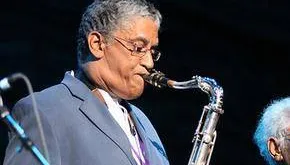
Photo courtesy of Amadee Castenell
“Chocolate Milk formed at St. Augustine High School, cutting their teeth playing for tourists on Bourbon Street and at Club 77 on Claiborne and Orleans. Like many local bands at the time, they got discovered by cutting tracks at Sea-Saint Studio in hopes that Allen Toussaint or his late partner Marshall Sehorn would hear their demos.
The song that did the trick was “Action Speaks Louder Than Words,” which became their first and biggest national hit. The stripped-down groove isn’t really typical Chocolate Milk as there are no evident horns (one of the keyboard-like sounds is actually Castenell playing sax through a wah-wah), and Richard never uses his falsetto. But it sounds a whole lot like the heavy, synth-driven funk that Prince (think Dirty Mind) and the Gap Band would come up with a half-dozen years later. “It’s hard to write a song like that,” Smith says. “We did it in our first batch and never really came back to it. It was more linear with just one line, not a lot of rhythm parts, a hard backbeat of two and four. The drum part was more a Meters kind of deal but the lines were more jazzy. All the horns were through different pickups. That was innovative for the time.”
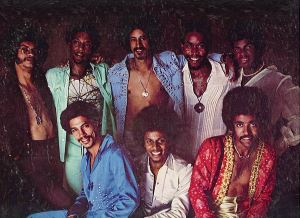
Chocolate Milk. Press photo.
Chocolate Milk, along with Allen Toussaint, signed a record deal with RCA in 1976. Brett Milano’s goes on to explain: “Never the world’s funkiest label, RCA couldn’t get Chocolate Milk an across-the-board hit and didn’t do much with the catalogue after their 1983 breakup; some of the band members don’t even own copies of their original albums. But it’s also that their sound was a long way from the slinky, stripped-down funk long associated with New Orleans. Chocolate Milk was an everything-at-once band with the horns, the dance steps, the busy percussion, the silky lead singer and the songs that alternately celebrated loving and partying. Their musical cousins and sometime-touring partners were the bands in the R&B mainstream at the time: The Bar-Kays, the Ohio Players, Kool and the Gang, Earth, Wind & Fire.
“That was the band era, and it was always ’My band vs. your band’,” recalls trumpet player Joe Smith, who went by Joseph Foxx III in the ’70s. “At that time, a band would need to have everything onstage. You traveled with the horns, the rhythm section, everything to make it more authentic. Some bands at that time were great in the studio, but it never sounded like that onstage—like the Ohio Players. Their records were great, but they couldn’t go out there and recreate it. With Chocolate Milk, we were always proud that we could do everything live that we did on record. We put everything into our live show. There was even a time when we added a couple of psychedelic guys, just for some visual pizzazz. I swear there were times we had about 100 people onstage.
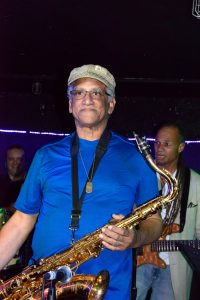
Photo from Facebook
“We didn’t really embrace New Orleans like some bands did,” he says. “To me, the Neville Brothers are New Orleans. ‘Hey Pocky Way’ is New Orleans. We were just hoping that if there was anything New Orleans about us, it would come out naturally from us growing up here and being around the second line for years. But we didn’t go out of our way to sound like that. We were more of a hard funk band with the horns. That’s why I think we’ve been so overlooked. A band like the Meters crossed over more than we did; they had white fans and black fans. We were seen as strictly an R&B group.”
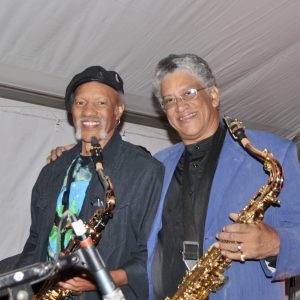
Charles Neville and Amadee Castenell at Paulie’s Jazz Camp Blues Fest. Photo from Facebook.
“RCA was a big label, and R&B was just part of what they did,” Smith says. “They did well with Evelyn ‘Champagne’ King, but we were different. When we did ‘Girl Callin’,” that was a number one record on the West Coast, and it wasn’t even being played in the East. Then we came out with ‘Say Won’tcha’—number one on the East Coast, and it did nothing in the West. In New Orleans, we played in all the clubs and everybody knew us there. So maybe it was bad management, or bad luck. We toured a lot, but we never made that step up.”
In addition to producing them, Toussaint made Chocolate Milk his regular studio band, beginning with Lee Dorsey’s Night People album. They were on the Aaron Neville sessions that yielded the epochal “Hercules” and the oft reissued “Tell It Like It Is” remake. Williams and the horn players were in on the Venus & Mars sessions with Paul McCartney, and Smith and Castenell remain Toussaint regulars.
Amadee Castenell moved to Massachusetts and continued to release albums. Live At Club 39 is not a recording of a show but a recording of Castenell and friends playing live at Club 39 Recording Studio in Sudbury, Massachusetts. Christopher Weddle, writing for OffBeat had these comments about the album: “Rather than be contained to any one genre, Castenell allows himself the freedom to expose his jazz and funk sensibilities in a well-crafted recording that shows his ability to fit in any number of genres including soul and rhythm and blues as well as the aforementioned jazz and funk.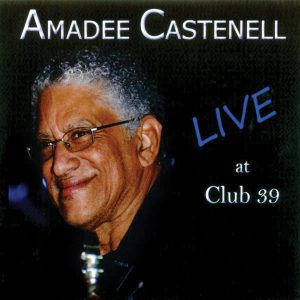
“I Wouldn’t Mind,” which was written by Allen Toussaint, features some gorgeous blowing from Castenell; and after years of playing with Toussaint, he really sounds confident and at home on this track. “Live at Club 39 ends on a beautiful note with a take on Louis Armstrong’s “Wonderful World” as Castenell trades solos with Joe Fox on flugelhorn.”
Castenell is survived by his wife, Priscilla.




